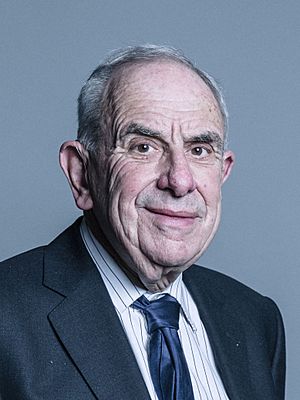Lennie Hoffmann, Baron Hoffmann facts for kids
Quick facts for kids
The Lord Hoffmann
GBS PC
|
|||||||||
|---|---|---|---|---|---|---|---|---|---|

Hoffmann in 2018
|
|||||||||
| Second Senior Lord of Appeal in Ordinary | |||||||||
| In office 10 January 2007 – 21 April 2009 |
|||||||||
| Monarch | Elizabeth II | ||||||||
| Preceded by | The Lord Nicholls of Birkenhead | ||||||||
| Succeeded by | The Lord Hope of Craighead | ||||||||
| Lord of Appeal in Ordinary | |||||||||
| In office 21 February 1995 – 21 April 2009 |
|||||||||
| Succeeded by | The Lord Collins of Mapesbury | ||||||||
| Non-Permanent Judge of the Court of Final Appeal of Hong Kong | |||||||||
| Assumed office 12 January 1998 |
|||||||||
| Appointed by | Tung Chee-hwa | ||||||||
| Personal details | |||||||||
| Born |
Leonard Hubert Hoffmann
8 May 1934 Cape Town, Union of South Africa |
||||||||
| Nationality | British | ||||||||
| Spouses | Gillian, Lady Hoffmann | ||||||||
| Children | 2 | ||||||||
| Alma mater | |||||||||
| Occupation | Jurist | ||||||||
| Chinese name | |||||||||
| Chinese | 賀輔明 | ||||||||
|
|||||||||
Leonard Hubert "Lennie" Hoffmann, Baron Hoffmann (born 8 May 1934) is a very important judge from South Africa and Britain. He is known for making interesting decisions and for being willing to try new ideas in law.
He has had a big influence on how contracts are understood, how companies are run, and how human rights and intellectual property law (like patents) are handled. He currently works as a judge in Hong Kong. Before that, he was a top judge in the United Kingdom from 1995 to 2009.
Contents
Early Life and Education
Growing Up in South Africa
Leonard Hubert Hoffmann was born on 8 May 1934. He grew up in a Jewish family in Oranjezicht, a place overlooking Cape Town, South Africa. His family had moved there from Eastern Europe in the late 1800s. His father was a well-known lawyer who helped start a large law firm in Africa.
Studying at University
Hoffmann went to the University of Cape Town for his first degree. Later, he received a special scholarship called a Rhodes Scholarship to study at The Queen's College, Oxford in England. There, he earned a degree in law called the BCL and won a special award for his legal studies.
From 1961 to 1973, he was a special teacher of law at University College, Oxford. He is now an honorary member there.
Legal Career
Becoming a Lawyer
Leonard Hoffmann became a barrister (a type of lawyer who argues cases in court) in 1964. His very first client was a student who had been asked to leave his home.
In 1963, he wrote a book called The South African Law of Evidence. This book became a very important guide for lawyers and has been updated many times. Because he was so good at his job, he quickly became one of the most sought-after lawyers. He was made a Queen's Counsel (a senior lawyer) in 1977.
Judicial Career
Becoming a Judge
Hoffmann became a judge in the Courts of Jersey and Guernsey in 1980, serving until 1985. He was also appointed to the High Court of Justice, Chancery Division in England from 1985 to 1992. When he became a High Court judge, he was given the title of Knight in 1985.
Later, he became a Lord Justice of Appeal in 1992, serving until 1995. In 1995, he was appointed a Lord of Appeal in Ordinary, which is a very high judicial position. This also meant he became a Baron Hoffmann, a member of the peerage (a special group of people with titles) in the United Kingdom.
Important Legal Decisions
Lord Hoffmann was known for his important decisions in various areas of law. For example, he set out five key rules for how to understand contracts. He retired as a Law Lord on 20 April 2009. After that, he became an honorary professor at Queen Mary, University of London, teaching about intellectual property law.
Work in Hong Kong
Since 1998, Lord Hoffmann has been a Non-Permanent Judge of the Hong Kong Court of Final Appeal. This means he helps make important legal decisions in Hong Kong. In 2014, he received a special award from the Chief Executive of Hong Kong called the Gold Bauhinia Star.
Views on National Security
Lord Hoffmann has been involved in important court cases about national security and terrorism. In one case in 2004, he strongly spoke out against laws that he felt threatened the basic values of the nation. He said that the real danger to a country's way of life comes not from terrorism itself, but from laws that go against its traditional values. He believed that it was up to the country's Parliament (its elected lawmakers) to decide if they wanted to give terrorists such a "victory" by passing such laws.
He also stated in another case in 2005 that using torture is "dishonourable" and harms the country and its legal system.
Personal Life
Family Life
Leonard Hoffmann is married to Gillian (Sterner) Hoffmann. They have two daughters and two grandchildren. They got married in Cape Town in the late 1950s. The Hoffmanns have lived in London and spent weekends in Chedworth.
Hobbies and Interests
Lord Hoffmann enjoys cycling and going to the opera. He has also used these interests to help various charities. He is also very interested in Israel, especially its legal system.
Images for kids
 | Laphonza Butler |
 | Daisy Bates |
 | Elizabeth Piper Ensley |


